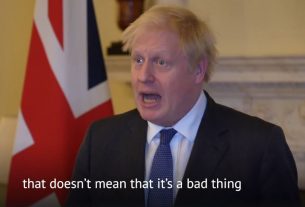Angela Rayner has come out fighting following a turbulent 24 hours in which she was scapegoated for Labour’s disastrous Super Thursday results and sacked as chair of the party by Sir Keir Starmer, who had just said he took “full responsibility” for the results.
However, his rush to be seen to act decisively, with speed and without hesitation – as he had when seizing an opportunity to oust Rebecca Long-Bailey from his shadow cabinet – quickly came to a juddering halt as the optics of his decision filtered by to the leader’s office.
It turns out Starmer could not sack Rayner from her post as Labour deputy leader, by virtue of that being an elected post. And Rayner is a popular deputy leader.
It is a dizzying turn of events. Witnessing the woman sacked on Sunday coming out on Monday to lead the party’s strategy to “reconnect Labour with working class voters” with a Guardian column “asserting her newfound authority”.
Rayner was expected to have been reshuffled off the stage but instead has emerged phoenix-like with a promotion to shadow chancellor of the Duchy of Lancaster, thereby becoming Michael Gove’s opposite (and taking over from Rachel Reeves who has replaced Annelise Dodds as shadow chancellor).
‘It’s my mates we need to speak to,’ says Rayner
Labour, Rayner writes, has been too “distant from the people” for too long and that “it’s my mates that I grew up with – and who are working minimum wage jobs – that we need to speak to and speak for again.
“For too long we have given off an air of talking down to people and telling people what they need or even what they should want or what they should think.”
It has been too much of “Labour doing things for people and communities, and not enough doing things with people and communities”, said Rayner. “Working-class people don’t want a handout or someone telling us what we should think. We want the opportunities to do it for ourselves.”
In what the Guardian describes as “a veiled comparison with other figures” Rayner says she owes everything to the party. “It’s only because of the Labour party and our trade union movement that I’ve gone from no GCSEs and a minimum wage job to where I am today.
“So it is my responsibility now to make sure that we learn the lessons and reconnect with the people and the places that we are here to fight for, and to make sure that they know that we speak for them and that we are on their side.”
Super Thursday successes shaded by leader’s action
Starmer’s sacking of Rayner raises fundamental questions about his leadership and the integrity of his strategy. Apart from anything else the optics were shocking with the leader blaming a northern working class woman for the defeat and raising the ire of party activists. It also served to take away the shine from Labour’s numerous Super Thursday’s successes, which, when the dust eventually settled, looked far better than may have been expected given the reaction to Hartlepool and the impression given by the media that Johnson and the Conservatives swept all before them.
Away from that historic byelection defeat, the evidence from Wales and victories in 11 of the 13 mayoral elections tells a very different story for Labour. Manchester re-elected Andy Burnham, as London did Sadiq Khan while West Yorkshire became the first to elect a woman metro mayor, with Labour’s Tracy Brabin making history on her 60th birthday.
“I never imagined I would be elected the Member of Parliament for my home town, let alone be asked to serve as the first ever metro mayor of West Yorkshire,” said Brabin. “The first ever woman metro mayor in the country.”
Brabin triggers byelection
Brabin’s win triggers a byelection for the Batley and Spen Westminster seat because the police and crime commissioner (PCC) role has been absorbed by the mayor’s job in West Yorkshire, and an MP can’t also be a PCC.
Another byelection will be another test for Starmer’s leadership and worryingly for Labour, Brabin has already conceded the constituency could follow Hartlepool and vote in a Conservative MP. A recent poll put the reds and blues neck and neck in Batley and Spen – another Labour stronghold, like Hartlepool, that voted to Leave the EU in 2016 (by 59.6%).
Rayner has been very publicly tasked by the leader with making sure Labour holds onto the seat while Starmer himself fights to re-establish his authority and command. The infighting between the rival factions will continue and probably intensify while Starmer’s abilities to cut through with the electorate are properly tested and the lifting of coronavirus restrictions sees a return to more traditional politics and campaigning.
However, critics argue Starmer has failed to lay out his vision and the Hartlepool results shows his strategy in taking on Johnson has signally failed. This despite the sleaze, the mishandling of the pandemic, the billions wasted, the PPE scandal, record NHS waiting lists, Brexit problems, trouble in Northern Ireland, more sleaze, cronyism, VIP contracts, 125,000 people dead, £400 billion spent, a fabricated culture war, ministers breaching the code, Jenifer Arcuri, wallpaper, John Lewis and a flat refurbishment.
Commons standards commissioner investigating PM
Not to mention a whole host of other scandals and controversies other than the latest confirmed on Monday that saw Downing Street “insist” the prime minister properly declared his winter Caribbean holiday with his fiancée Carrie Symonds
It comes as the Commons standards commissioner Kathryn Stone confirmed she is investigating if Johnson correctly entered the £15,000 worth of accommodation provided, by the founder of Carphone Warehouse, David Ross.
The prime minister is one of nine MPs currently under investigation by Stone into allegations MPs have breached the House of Commons’ Code of Conduct for Members. If Stone upholds the allegation it either leads to the “rectification process” (where the MP admits the breach, says sorry and explains their ‘journey’ so it does not happen again) or it is referred to the select committee on standards, who can “recommend a sanction is imposed on the MP.”
But none of this is cutting through in England where furlough and a vaccine bounce has given the Conservatives another MP and the government a massive boost ahead of today’s (Tuesday) Queen Speech that will set out their ambitions and priorities for the UK post-Covid and post-Brexit.
England records no Covid deaths for first time since July
Meanwhile, there were no Covid deaths recorded in England on Monday, for the first time since July as Boris Johnson announced the next stage of restrictions being eased is to proceed as planned. It will be “the single biggest step on our roadmap”, which, the PM said “will allow us to do many of the things we have yearned to do for a long time.”
Top of the list is hugging loved ones, closely followed by the reopening of pubs, restaurants and cafes and people being able to go on foreign holidays from Monday, May 17. Johnson told the Downing Street briefing that the public must “protect these gains” by being cautious with the newfound freedoms, that will see leisure centres reopen – such as galleries and theatres, bingo, cinemas and soft play centres – while groups of six/or two households will be able to meet indoors and enjoy domestic overnight stays.
The vaccine rollout – identified as key to the Tories success at the polls – has resulted in more than two thirds of the UK’s adults having at least one jab, with 18 million having had two jabs. Yet Johnson was quick to remind that risks persist and that the government’s guidance will ensure people can make an informed choice about their behaviour as restrictions are eased.
“This doesn’t mean that we can suddenly throw caution to the winds. We all know that close contacts such as hugging is a direct way of transmitting this disease,” said Johnson. “So I urge you to think about the vulnerability of your loved ones.”
Groups of up to 30 can meet outdoors and crowds can return to concert halls and stadiums, albeit subject to some restrictions and capacity limits.
For care home visitors, the changes will allow up to five (named) visitors with greater freedoms to allow low risk visits without the need to quarantine on their return to the home.
England remains on track for the final lifting of restrictions on June 21 and Johnson said details will be released in the next weeks “”about what the world will look like and what role there could be, if any, for certification and social distancing”, giving business time to prepare.




